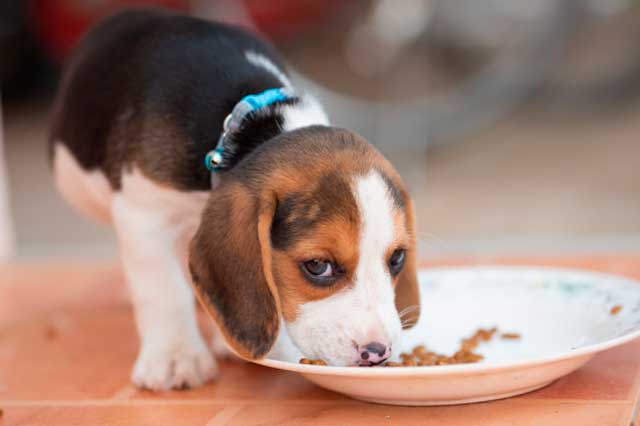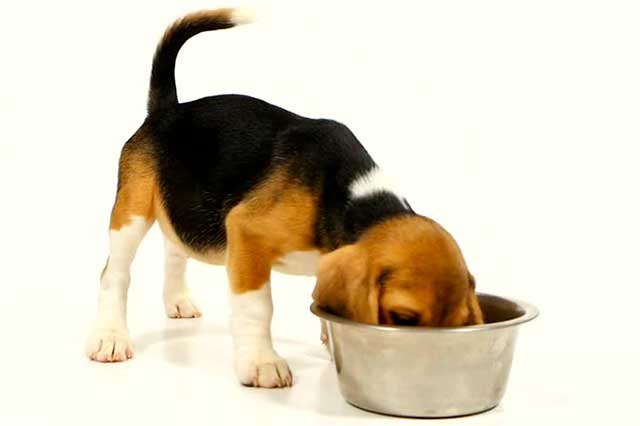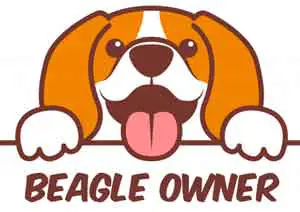
As a new owner of a Beagle, I was unsure of what food and diet I need for Bella. Their were so many to choose from!
After some research and asking questions of other owners. I became more knowledgeable, and this is what I found.
A fully grown, adult Beagle will be happiest if his daily ration of food is split into two meals – one in the morning and one in the evening.
Beagles are not difficult dogs to feed; they will eat just about anything. Keep to the breeder’s recommended diet as any sudden changes may well upset a puppy’s digestive system.
Beagles are very food orientated and to expect them to ‘survive’ for 24 hours between meals is unrealistic.
Many will be driven to thieving and scavenging although some will do this no matter how much you feed them.
There are many proprietary brands of dog food available and whilst the manufacturers’ feeding guidelines are helpful, the Beagle’s ability to put on weight quickly, should not be underestimated.
What do Beagle puppies eat?
With Beagle puppies, during the first 3 to 4 weeks, their main diet will be the dam’s milk. By week 4 they are being slowly weaned with an incremental introduction to solid foods.
This is done by mixing canine milk replacer with the food that the dam has been eating.
Puppies need lots of protein and calories when they’re still growing. At about 12 months your Beagle will no longer be a puppy and his/her dietary needs will have changed.
Beagles can have sensitive digestive systems that don’t respond well to being overloaded by too much food.
When you’re feeding your puppy, it’s better to split their food portion for the day into smaller, frequent meals to avoid any pressure on their digestion. Here’s a simple guide:
- Weaning, cater for four meals a day
- Up to 4 months old puppies then allow three meals a day
- 4 to 10 months old plan for two meals a day

Don’t worry too much if your puppy doesn’t eat all of the food you put down at mealtimes; their appetite will naturally vary and by having regular meals they will be able to satisfy their hunger next time.
Due to the rapid phases of growth puppies experience, they need a food which has higher energy-density than an adult dog.
However, puppies don’t know how to regulate their food intake, so it’s essential to maintain portion control and avoid weight gain.
The best way you can feed your puppy is to create a routine and stick to it. Feed them at the same times, in the same place, using the same bowl, so they understand exactly when and where mealtimes are.
They don’t need variety in their diet in the same way humans do, so stick to the same food each time.
When you do transition to a different food – for example, when they move from being a puppy to an adult – do it over a week or so, by mixing the new and old foods together and gradually increasing the percentage of new food.
Once you’ve put your puppy’s bowl down, they’ll smell and nose the food to test its temperature.
When they’ve started eating make sure to keep an eye on them to ensure their safety, but don’t fuss over them while they’re eating as it could cause protective, aggressive behaviour.
Leave the bowl down for 15 to 20 minutes and then remove it, even if there is food still uneaten; this will help them learn they must eat when you decide.
You should also feed your puppy after you’ve eaten or at a different time completely to demonstrate the hierarchy of the household.
Always make sure there is plenty of water available, and change it regularly.
Giving your puppy scraps or leftovers can result in bad behaviour as it confuses their routine.
Similarly, try and avoid offering food as a reward too frequently and do not offer treat food as a way to entice them to eat their ‘main’ food – it’s too confusing for your puppy and may result in them not eating.

What do fully grown Beagles eat?
Adults can be fed twice a day; the daily proportion should then be divided in two.
A six-month-old pup should be switched to adult food in order to allow puppy to develop slowly, which is then achieved by reducing the protein intake.
Vegetables, fruits, and carbohydrates such as brown rice do add healthy fiber to the food.
Avoid ingredients like meat by-products and cereal grains such as corn or wheat, which can be harder for your Beagle to digest than whole meats or meat.
Some Beagles react badly when they are fed complete food which is high in additives and colouring and owners may feel it is better to avoid such foods.
Sensible leftovers can be fed as part of the daily ration, they help to make dinner time even more interesting. Hot and spicy foods are best avoided.
Remember, some foods can have a very bad effect upon Beagles, leading to illness and occasionally death. These include chocolate, onions, raisins, macadamia nut and grapes.
As your Beagle gets older and less active you may need to adjust the diet and feed less protein.
Beagles weigh around 25 pounds when they’re fully grown. Of course, your dog may weigh a little more or a little less.
A healthy Beagle in this weight range should be consuming up to 1,010 calories each and every day.
You can use your dog’s actual weight to get a better idea of how much you should be feeding your pet.
Beagles are considered to be small dogs, so they will need roughly 40 calories of food for each pound of body weight.
If your dog spends all day relaxing around the house, you’ll need to provide a little less food to prevent weight gain.
On the other hand, active dogs who exercise frequently may need upwards of 1,100 calories a day.
There are debilitating health problems which can affect your Beagle, as they are prone to gain excess weight.
To keep your Beagle happy and healthy for the long term, it’s important that you feed quality, nutritious food.
Here are some of my favorites;
- Best Overall: Crave Grain Free Adult Dog Food
- Weight Maintenance Diet: Solid Gold Weight Control Dog Food
- Best for Puppies: Wellness Complete Grain Free Puppy
- For Sensitive Systems: Natural Balance Limited Ingredient Chicken
- Most Affordable: Diamond Naturals Adult Recipe
Beagle diet health issues
Beagles are generally a healthy and fit breed of dog. If kept a good weight and exercised regularly they will usually live for 12-14 years.
The breed does have a few ailments which are breed specific and some which are found in other breeds too.
Some can be genetically screened for and health experts are actively researching to try to work out why they occur and how to prevent them happening.
Beagles are prone to some health issues that are directly affected by what they eat.
Can Beagles be overweight?

Obesity is a very real problem with Beagles. These dogs will continue to eat long after they are full. You should never leave food out for your dog to free-feed. You need to separate portions accordingly.
Overweight Beagles can suffer from a range of secondary health issues. They can suffer from heart problems, organ failure, and more.
To avoid weight gain, follow a strict feeding schedule and adjust caloric intake as your dog’s lifestyle changes.
One solution to this is to place your Beagle on a high protein diet allowing for a safe weight loss in obese Beagles.
A lower calorie dog food with increased amounts of fibre might also help your overweight Beagle lose some unwanted pounds.
Hypothyroidism
If your dog suffers from hypothyroidism, it means that their thyroid isn’t producing enough hormones for the body. This condition may be avoided with a healthy diet and regular exercise.
Luckily, once it’s diagnosed, it’s relatively easy to treat. Your pup will need to take supplementary hormones.
Not only that, but it’s recommended that these dogs are placed on a modified diet that’s grain-free and low-carb.
Obese Beagles joint problems
Beagles are susceptible to a number of joint issues, especially when their overweight. Any extra weight on their midsection puts more stress on their joints than necessary.
Arthritis is a common problem among older Beagles. It causes chronic aching, making it difficult to move around.
You can support their aging joints with foods that contain glucosamine and chondroitin.
Hip dysplasia is another common concern. This often occurs when a dog gains too much weight in their puppy years. The hip joints become malformed, causing problems in the future.
In summary, you should be as careful and vigilant about your dog’s food as you are about your very own.
If you want your Beagle to thrive and stay healthy, take the extra time to find the food that works for their unique dietary needs.
